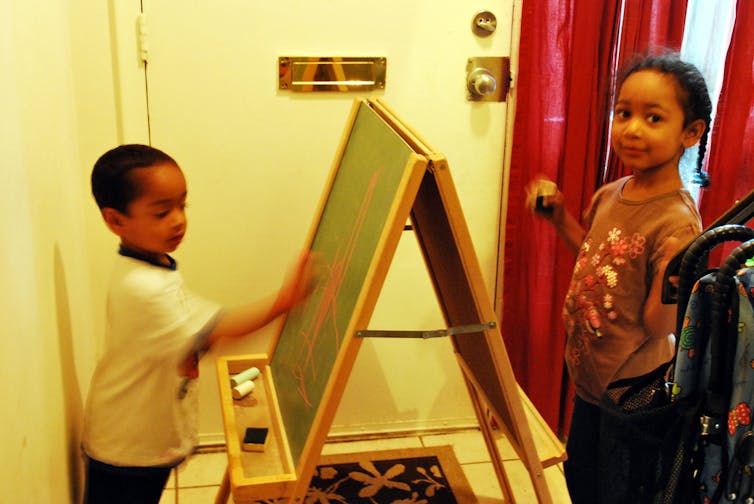Should homeschool parents have complete control over the content and outcomes of their children’s education, with no external assessment or evaluation from the state?
The Texas Supreme Court is exploring this very question as they consider the case of the McIntyre family versus the El Paso school district, which involves allegations that the homeschooled McIntyre children did little or no academic work and that their parents refused to provide any evidence of such work.
After having studied homeschooling practices and policies for more than a decade, I contend that states need to find a middle ground – a modest set of expectations for homeschoolers that protects children’s basic educational interests while still leaving plenty of room for curricular flexibility.
What does the law say?
The fact is that homeschooling regulations vary widely from state to state.
In a 1994 decision in Texas Education Agency v Leeper, the Texas Supreme Court ruled that “homes in which children are taught in a bona fide manner from a curriculum designed to meet basic education goals” would qualify as private or parochial schools under the Texas compulsory education law.
However, there is no regulatory mechanism that exists in the state to assess whether basic education goals are being met by homeschoolers. In fact, Texas is one of 11 states that do not require families even to notify educational authorities that they homeschool their children.
A few states, such as North Dakota, require homeschool parents to meet certain educational requirements. Other states, such as California, stipulate that homeschoolers must study subjects similar to public schools. And some states, such as New York, require parents to submit curricular plans each year.
About half of states mandate some form of assessment through portfolios or standardized tests. But the interesting part is that most of them also have loopholes that excuse parents from actually reporting the results.
What kind of regulation makes the most sense?
In my view, most of these requirements are neither appropriate nor effective. Authorities can approve curricular plans, but such documents may have little to do with what actually occurs during the year.
Indeed, much of the value of the homeschooling approach rests in its inherent flexibility to customize learning experiences in ways that work best for individual children. While portfolios of student work at the end of the year might be revealing, they are also difficult to evaluate consistently and efficiently.
With this in mind, standardized basic skills tests hold the most potential for protecting children’s basic educational interests while leaving room for curricular flexibility.
Few of us would deny that children need basic skills of literacy and numeracy in order to function independently as adults. Certainly all the homeschool parents I’ve spoken with over the years would share this view.
I suspect that the vast majority of homeschoolers would have no trouble passing basic skills tests. And even for students who struggle with basic skills assessment, the next step would be a closer look by the state to understand the context, rather than an automatic assumption of educational neglect.
It’s also worth pointing out that basic skills requirements need not dictate the shape or method of homeschool curricula; there are countless ways to cultivate such basic skills in children – from highly structured curricula to student-directed projects to experiential learning.

But is a good education only about the development of basic skills?
While the answer to this question should be obvious, there is plenty of reasonable disagreement about what other skills, knowledge and dispositions children should develop – and whether such expectations should be standardized for each child.
Regulations to protect the most vulnerable
Why insist on this sort of oversight?
After all, homeschool advocates such as the Home School Legal Defense Association and the National Home Education Research Institute claim that the average homeschooler performs significantly better than public school students on standardized tests.
The plain truth is that no such evidence exists. Wide-scale studies of homeschooler test performance have been based on volunteer samples, often with testing conditions far different from those of public school students.
And even if we knew that the “average homeschooler” compared favorably with public school students, that would say nothing about the experience of children whose parents use homeschooling as a cover for educational neglect or worse.
Homeschool advocates will also point to data showing no correlation between the amount of regulation in a particular state and the test scores reported by homeschoolers in those states.
But here again we run into the problem with volunteer samples – it seems highly unlikely that homeschool parents who neglect their responsibilities would even have their children take such tests, much less report the results.
Finding middle ground
Plenty of reasonable disagreement exists about what constitutes a great education. But we should all be able to agree that all children have a vital interest in gaining basic skills of literacy and numeracy.
Protecting those interests, while also honoring the role of parents in shaping their child’s educational experience, means finding a middle ground between intrusive regulations and having no oversight at all.
I agree that homeschool parents should be given wide latitude in the shape of their curricula and the experiences they provide for their children. But a complete lack of external accountability leaves too much room for neglect and abuse to go undetected.
A modest set of expectations such as annual reporting of enrollment and basic skills testing would go a long way toward protecting children’s interests while preserving homeschool freedoms.

